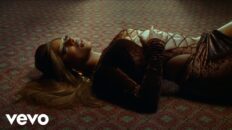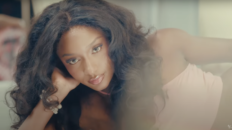
Naughty Girl: Beyoncé’s Fierce Anthem to Owning Your Sass
Few artists command a room like Beyoncé. And when she struts onto the scene with a song like “Naughty Girl,” the room doesn’t just stand still—it ignites. Released in 2003 on her debut solo album, “Dangerously in Love,” “Naughty Girl” wasn’t just a chart-topping hit; it was a cultural phenomenon, a sonic middle finger to societal expectations and a celebration of fierce female independence.

From the opening distorted guitar riff that feels like a whip crack across the dance floor, “Naughty Girl” announces its sassy arrival. Beyoncé’s vocals drip with honeyed defiance, throwing down lyrics like, “I like my men like I like my money, grown and independent.” This ain’t your damsel in distress ballad; this is a declaration of self-sufficiency, a woman who knows her worth and isn’t afraid to flaunt it.

But “Naughty Girl” isn’t just about flaunting; it’s about reclaiming the narrative. The term “naughty girl” has historically been used to shame and control women, particularly women of color. Beyoncé flips the script, owning the label and turning it into a badge of honor. She’s “naughty” because she doesn’t conform, because she challenges expectations, and because she unapologetically enjoys life on her own terms.

The music video is a visual feast that amplifies the song’s message. Beyoncé, clad in a series of fierce outfits, struts with an untouchable confidence. She’s surrounded by snakes, a classic symbol of temptation and danger, but here, they seem to slither in her service, adding to her mystique. The choreography is sharp and playful, highlighting her flawless control and mesmerizing stage presence.

“Naughty Girl” resonated deeply with women around the world. It became an anthem for those who felt silenced, marginalized, or judged for not fitting into neat societal boxes. It was a reminder that being “naughty” isn’t about being bad; it’s about being true to yourself, owning your desires, and refusing to be boxed in.

The song’s impact wasn’t just cultural; it was commercial. “Naughty Girl” topped the Billboard Hot 100 chart, becoming Beyoncé’s fourth consecutive number-one single. It won awards, received critical acclaim, and cemented her status as a global pop icon.

But even more than the accolades, “Naughty Girl” continues to inspire. It’s a reminder that being “naughty” can be a powerful act of liberation. It’s a call to embrace your individuality, challenge limitations, and dance to the beat of your own drum, no matter how loud or off-key it might seem. So, crank up the volume, put on your fiercest outfit, and let your inner “Naughty Girl” loose. The world needs your unapologetic swagger.
And remember, as Beyoncé reminds us in the song’s final line, “If you wanna be my lover, you gotta get with my friends.” Because at the end of the day, being “naughty” is often more fun with a squad at your side.
So, ladies (and gents who appreciate fierce queens), let your flag fly. Own your sass, embrace your flaws, and strut your stuff like the “Naughty Girl” you were born to be. The world is your dance floor, and Beyoncé just turned up the volume.
Fun Fact

Did you know the iconic melody in “Naughty Girl” isn’t Beyoncé’s creation? It’s a clever reimagining of the chorus from Donna Summer’s 1975 disco hit “Love to Love You Baby”! While the original boasted funky guitars and upbeat energy, Beyoncé transformed it into a sultry slow-burn, giving a classic tune a surprising and captivating new life. This unexpected musical connection adds another layer of intrigue to the song’s exploration of desire and self-confidence. Listen closely and see if you can catch the echo of Donna Summer’s disco groove in Beyoncé’s contemporary reinvention!
About the Artist
Born in Houston, Texas, in 1981, Beyoncé’s musical destiny was evident from a young age. With a voice that could captivate audiences and moves that defied gravity, she rose to fame in the late 90s as part of the iconic girl group Destiny’s Child. Their string of chart-topping hits like “Say My Name” and “Independent Women Part 1” not only redefined popular music but also empowered a generation of young women.
But Beyoncé’s ambitions soared beyond group success. In 2003, she embarked on a solo career with the audacious “Dangerously in Love.” This explosive album yielded global anthems like “Crazy in Love” and “Naughty Girl,” showcasing her vocal prowess, fierce lyrics, and captivating stage presence. She established herself as a solo force to be reckoned with, owning her sexuality and advocating for female empowerment, paving the way for a new generation of artists.
Beyoncé’s musical evolution mirrored her ever-growing influence. Each album became a sonic journey, a daring exploration of genres and themes. From the soulful vulnerability of “B’Day” to the political commentary of “Lemonade,” she used her platform to speak her truth, tackling issues of race, gender, and societal inequalities. She collaborated with diverse artists, pushing boundaries and proving that music could be both catchy and meaningful.






















